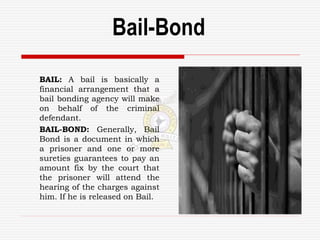Unlocking the Secrets of Bail Bonds: A Detailed Review
Browsing the complex world of Bail bonds can often feel like deciphering a cryptic code, with layers of complexity that stay concealed to many. From the various kinds of Bail bonds readily available to the essential function of a co-signer, each aspect plays an essential part in this lawful procedure.
Comprehending Bail Bonds Process
When facing a lawful circumstance that needs posting Bail, understanding the Bail bonds procedure is vital to navigate the complexities of the judicial system successfully. Bail bonds work as a financial guarantee to the court that the offender will appear for all called for court looks. This process involves a bondsman, who generally charges a non-refundable charge, typically around 10% of the total Bail quantity, to publish the Bail on behalf of the accused.

Moreover, collateral, such as home or assets, may be called for to protect the bail bond. Understanding the terms and conditions of the bail bond agreement is important to guarantee compliance and avoid any kind of added legal repercussions. By comprehending the Bail bonds process, individuals can make informed choices when browsing the legal system.
Types of Bail Bonds Available
The most common type is a guaranty bond, where a bond bondsman pays the complete Bail quantity on behalf of the defendant in exchange for a non-refundable charge, generally around 10% of the complete Bail. Cash bonds require the full Bail amount to be paid in money prior to the offender can be launched.
Additionally, there are federal Bail bonds for cases involving federal fees and migration bonds for people apprehended by Migration and Traditions Enforcement (ICE) Recognizance, or trademark bonds, are granted based on the defendant's guarantee to appear in court without needing any type of repayment. Finally, transfer bonds are utilized when an accused is detained in a various state and requires to publish Bail to be released. Comprehending the different types of Bail bonds offered can aid defendants navigate the lawful procedure more efficiently.
Duties of the Co-Signer

Additionally, as a co-signer, you are answerable for ensuring that the offender complies with any conditions established by the court, such as attending therapy or refraining from specific tasks. It is essential to preserve open interaction with the defendant to check their conformity and address any type of concerns quickly. Eventually, being a co-signer entails a significant degree of trust fund and responsibility, as you are economically and lawfully linked to the defendant's Bail responsibilities.
Effects of Skipping Bail

Skipping Bail can have major lawful repercussions for both the co-signer and the offender associated with the bail bond contract. When a defendant fails to show up in court as called for after posting Bail, the court normally issues a warrant for their arrest. This bail bond how it works not only aggravates additional info the defendant's legal problems however additionally places the co-signer in jeopardy.
For the accused, avoiding Bail can bring about added criminal charges, such as contempt of court or Bail jumping, which can lead to penalties, a revocation of Bail benefits, or perhaps jail time. In addition, the offender might lose the Bail amount paid and any collateral supplied.
If the defendant skips Bail,Co-signers also face significant consequences. As the co-signer guarantees the defendant's appearance in court and is financially liable for the full Bail amount, they may be required to pay the whole Bail if the offender absconds. This can bring about financial strain, harmed credit history, and potential lawsuit versus the co-signer.
Trick Consider Bail Bond Approval
When looking for authorization for a bail bond, several crucial variables enter into play that significantly affect the decision-making process. The first crucial element is the extent of the supposed crime. A lot more major offenses might result in greater Bail amounts or perhaps a rejection of Bail entirely. The offender's criminal history is an additional vital consideration. A history of previous sentences or a pattern of avoiding court days can raise warnings and make it harder to protect a bail bond. bail bonds dayton ohio.
In addition, the connections the defendant has to the neighborhood can influence the authorization of a bail bond. Strong community ties, such as secure employment, household links, and long-lasting residency, can operate in support of the offender. On the various other hand, flight risk concerns might develop if the offender has no solid connections to the community. Funds likewise play a considerable duty. The capacity to pay the Bail quantity or give security can increase the chances of bail bond approval. Ultimately, a combination of these factors is weighed by the court when identifying whether to authorize a bail bond.
Conclusion
To conclude, understanding the Bail bonds process, the kinds readily available, the duties of the co-signer, the repercussions of avoiding Bail, and the key factors in bail bond authorization are crucial for browsing the lawful system. By familiarizing oneself with these aspects, people can make enlightened choices and guarantee a smoother process when managing Bail bonds. It is vital to comply with the requirements and guidelines stated to stay clear of any type of prospective complications.
The most usual kind is a surety bond, where a bond bondsman pays the complete Bail amount on behalf of the offender in exchange for a non-refundable charge, usually around 10% of the complete Bail. By signing the bail bond agreement, you are taking on the obligation content of guaranteeing the complete Bail amount if the accused fails to show up in court - bail bond company dayton ohio.Missing Bail can have major lawful repercussions for both the offender and the co-signer entailed in the bail bond agreement. The capability to pay the Bail quantity or offer security can increase the possibilities of bail bond approval.In final thought, recognizing the Bail bonds process, the types readily available, the responsibilities of the co-signer, the effects of skipping Bail, and the essential variables in bail bond approval are vital for browsing the legal system